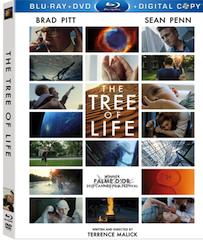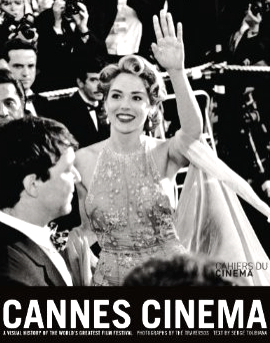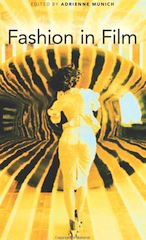Film Review: The Tree of Life
- SUBSCRIBE
- ALREADY SUBSCRIBED?
BECOME A BONJOUR PARIS MEMBER
Gain full access to our collection of over 5,000 articles and bring the City of Light into your life. Just 80 USD per year.
Find out why you should become a member here.
Sign in
Fill in your credentials below.
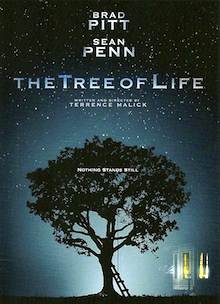
France has been good to Terrence Malick. He recently won his second award at Cannes, the Palme d’Or for The Tree of Life. His first film, Badlands, based on the Fugate-Starkweather murder spree, was an unforgettable look at America’s hunger to create an Edenic paradise amidst vapid pop culture and family dysfunction. It also introduced Malick’s signature devices: classical music scores and voice-over narration. He continued in this vein in Days of Heaven (1978), trying to turn a Depression story of farmers into something Biblical. The film, despite beautiful cinematography (and despite winning the director’s first Cannes award), was deemed too arty by critics and public.
And apparently by Malick himself: he left the US to live a reclusive life in Paris, immersing himself in philosophy and churning out ideas for films (and other works). He didn’t make another movie for 20 years. Malick returned with The Thin Red Line (1998), a WWII movie set in Guadalcanal. His themes remained the same—the search for Eden in the modern age—and so did his technique. But his approach turned symphonic and philosophical, more European. That film had its detractors but has won the status of a modern classic. He followed that with The New World, a retelling of the Pocahontas story with grand moments but still constrained by a myth better suited to Disney.
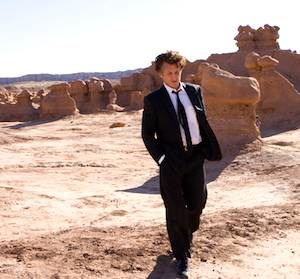
With The Tree of Life Malick has unleashed his ambitions. He links a family story (based on his own) with the patterns of nature and the cosmos itself. It resembles Kubrick’s 2001 in its vaulting ambition and technique, with bravura sequences showing the development of the universe and evolution on Earth. But in 2001 such sequences were linked to the narrative while in Tree they are free-associational reveries. It makes for a stunning sound and light show but could be lopped off without any loss to the story.
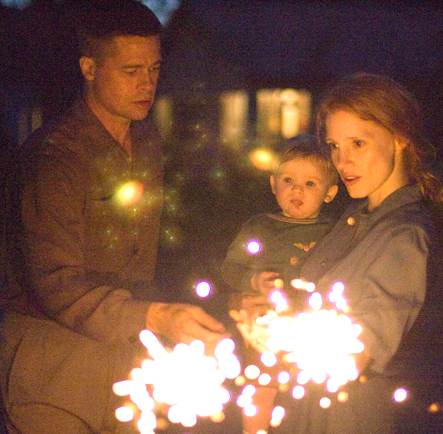
In Tree, Malick returns to 1950s Texas, the setting of Badlands. The movie focuses on a young boy, Jack (Hunter McCracken—Sean Penn plays him as an adult), perhaps based on the director. His family is dominated by the father (Brad Pitt)—a charismatic but severe businessman working for a large industrial company. Away from work he’s obsessed with his backyard garden, working relentlessly and treating his sons like migrant laborers. Jack, the oldest, is damaged by the abuse—we can’t help thinking this was how Badland’s Kit (Martin Sheen) turned out as he did. McCracken gives an extraordinary performance as a child seemingly headed for a tragic end. It sounds dramatic, but Malick’s style is the opposite of dramatic, and the lack of dramatized narrative makes for an impressionistic jumble of vignettes.
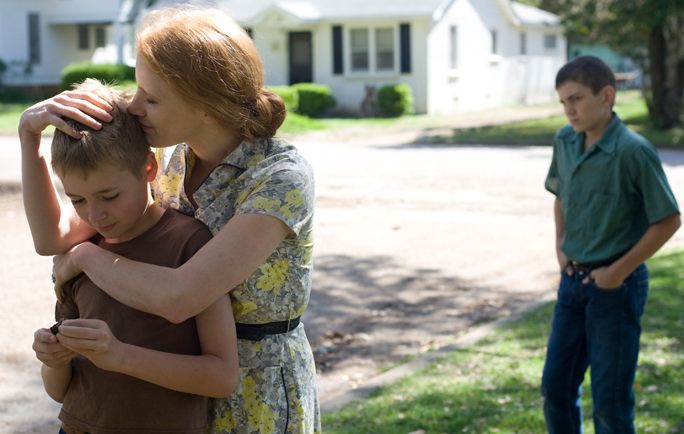 The mother is supposed to be the counterweight to the father—grace as opposed to nature. But Jessica Chastain (startlingly evoking Sissy Spacek, Badlands’ other star) is not just passive but vacant. The film’s arc has nothing to do with her, but once again the father, more precisely the closing of his plant. The family isn’t faced with penury, but something just as traumatic: being uprooted. That’s a fact of life, especially in America, but Malick doesn’t deal with it realistically or dramatically. While Tree of Life is set in motion by a family tragedy, it ends with New Agey imagery that is unconvincing to say the least.
The mother is supposed to be the counterweight to the father—grace as opposed to nature. But Jessica Chastain (startlingly evoking Sissy Spacek, Badlands’ other star) is not just passive but vacant. The film’s arc has nothing to do with her, but once again the father, more precisely the closing of his plant. The family isn’t faced with penury, but something just as traumatic: being uprooted. That’s a fact of life, especially in America, but Malick doesn’t deal with it realistically or dramatically. While Tree of Life is set in motion by a family tragedy, it ends with New Agey imagery that is unconvincing to say the least.
The Tree of Life has many powerful moments, moving performances and breathtaking images. But it lacks dramatic focus and narrative development. And as harsh as the father comes off, the director could have used some of his advice. Even a tree of life needs pruning.
Dimitri Keramitas is a Paris-based film reviwer who covers the latest French film releases for BonjourParis every other Wednesday. Click on his name to read his past reviews published in BonjourParis.
PRACTICAL INFORMATION
View the trailer at the official film website
Do you have a story or review to share with our readers? Please contact us.
Subscribe for free so you don’t miss a story. Search our library with 7,200+ stories and 50 original stories published monthly. BonjourParis has been a leading online France travel and French lifestyle site since 1995.
Thank you for using our direct link to: Amazon.com. Your supports allows us to publish BonjourParis.
Check Francophiles Favorites for French-themed items for travelers and Francophiles. Most recent listings at last pages.
Short-cut to our 100 Top Selling Items (Please wait for widget to load—updated daily)
Save an additional 5% on Auto Europe car rentals:
Auto Europe is your best choice for car rentals in France and Europe. Most competitive rates, no drop fees.
Bookmark & use our link for a 5% code discount here: Auto Europe Car Rental
Don’t overlook Auto Europe for international flights, click Auto Europe Flights
More in Cannes film festival, Dimitri Keramitas, film review, French awards


